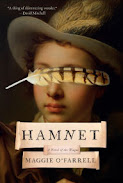Hamnet is a retelling of the family life of William Shakespeare. He and his wife, Agnes, had three children. First was a girl and then there were twins, a boy and a girl. The first part of the novel explores Will and Agnes' courtship; Will was a tutor to Agnes' brothers. Agnes was considered a 'wild child', a woman who spent her time outside gathering herbs, flying a falcon and could see the future. Many considered her a witch or next to one. Will was from a family of tanners and glove makers. His father was an abusive man and Will was his main target. He feels constrained by village life.
After their marriage, the couple finds a way to live together. They live in a house which is joined to the family house of the Shakespeares. There is still tension with the father but he has lost much of his power. Agnes is closest to her brother Bartholomew. She goes to him when she has issues or needs advice. With his help, Agnes comes up with a plan that allows Will to go to London where he is out from under his father's thumb and where he grows successful, starting a playhouse. She and the children remain in the village of Stratford as the younger girl is too frail to handle life in a city.
But disease can find you anywhere. One day the girl, Judith, is fine before supper and deathly ill by night. She has the plague and there is little hope. Will is sent for but when he arrives he finds that Judith has rallied and instead her twin brother, Hamnet, has contracted the illness and died.
The rest of the novel explores the grief of losing a child. It is one of the finest stories of this grief I've ever read. Each parent is consumed with guilt about the boy's death; each must find their own way of grieving and moving forward. There are the other children to be considered and life must go on. But how can it go on without their Hamnet?
This book won the Woman's Prize For Fiction this year and the announcement was made as I was in the midst of reading it. I can heartily concur with its selection. The writing is fresh and immediate and it is a retelling of life in that period that the average person can connect with. The death of a child was so common in this time and the novel explores what that fact must have been like and what effect it had on marriages. This book is recommended for readers of literary fiction.





No comments:
Post a Comment